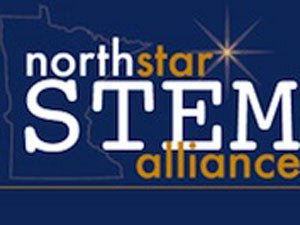University-led consortium doubles number of underrepresented minority STEM graduates

Contacts:
Matt Hodson, University News Service, mjhodson@umn.edu, (612) 625-0552
Rhonda Zurn, College of Science and Engineering, rzurn@umn.edu, (612) 626-7959
Kate Tyler, Academic Administration, UMN System, ktyler@umn.edu, (612) 626-8535
North Star STEM Alliance to receive an additional five-year, $2.5 million award from National Science Foundation
Who: Robert J. Jones, North Star STEM Alliance principal investigator and U of M system senior vice president for academic administration; Alliance co-principal investigators F. Abel Ponce de León (senior associate dean, U of M College of Food, Agricultural and Natural Resource Sciences), Paul Strykowski (associate dean, U of M College of Science and Engineering) and Robin Wright (associate dean, U of M College of Biological Sciences); students, alumni and faculty from the U of M and other participating institutions.
What: North Star STEM Alliance 2012 kickoff event
When: Tuesday, Sept. 25. (Press preview: 5 to 6 p.m. Kick-off event: 6 to 9 p.m.)
Where: Press preview: M Club Room at TCF Bank Stadium. Kick-off event: DQ Room at TCF Bank Stadium, 2009 University Ave. SE, Minneapolis
MINNEAPOLIS / ST. PAUL (09/20/2012) —The University of Minnesota Twin Cities, 13 collaborating higher education institutions and three community partners of the North Star STEM Alliance have been awarded an additional five years of funding totaling $2.5 million from the National Science Foundation (NSF) through the Louis Stokes Alliance for Minority Participation (LSAMP) program. Additional funding was awarded as the Alliance approaches its initial five-year goal of doubling the number of underrepresented minority students receiving bachelor’s degrees in the science, technology, engineering and mathematics (STEM) fields from 2007-12.
The grant renewal will be celebrated during the annual North Star STEM Alliance Kick-Off, to be held the evening of Tuesday, Sept. 25 in the DQ Room at TCF Bank Stadium, 2009 University Ave. SE, Minneapolis.
The University of Minnesota Twin Cities has also been named one of four national recipients of a two-year Minority Male STEM Initiative (MMSI) grant from the Association of Public and Land-Grant Universities (APLU). Funded by a major grant from The Kresge Foundation, the MMSI grant supports a partnership between the U of M and Minneapolis Technical and Community College (MCTC) to increase recruitment, retention and suucess of minority males in STEM majors.
“We’re very excited to be able to continue to build on the success of our innovative LSAMP and MMSI partnerships,” said Robert J. Jones, senior vice president for academic administration for the University of Minnesota system and principal investigator for the North Star STEM Alliance. “By increasing access to STEM fields among underrepresented groups and fostering an environment for continued success, the Alliance has been transformational for students, the University and other partner institutions, and STEM-focused industries throughout Minnesota and beyond.”
The North Star STEM Alliance began June 1, 2007, as a partnership among Minnesota colleges and universities and two community organizations. The University of Minnesota Twin Cities is the lead institution, with the collaborative effort involving faculty and staff from the College of Biological Sciences, the College of Food, Agricultural and Natural Resource Sciences, the College of Science and Engineering, and the Office for Equity and Diversity. The University’s Duluth and Morris campuses are also members.
The Alliance’s goal was to increase from 136 (the number of underrepresented students graduating from these institutions in 2004-05) to 272 the number of African American, Hispanic/Latino, Native American, Alaska Native and Pacific Islander students who graduate with STEM degrees in 2012. As the Alliance meets this goal, NSF challenges institutions to double the number of graduates again by 2017.
“Minnesota has one of the nation’s largest educational achievement gaps. The state’s universities and colleges must be proactive to address this problem and help close that gap," said University of Minnesota President Eric Kaler. “As more and more jobs are created in STEM-related industries, it is imperative to provide a top-notch education in these fields that is accessible to all students from all backgrounds. The successful statewide partnerships forged by the North Star STEM Alliance and the Minority Male STEM initiative are addressing these challenges head-on.”
Best practices employed by the North Star STEM Alliance to retain underrepresented minority students in STEM include:
- Seminars preparing students and supporting them in undergraduate research.
- Community building through cohorts and student organizations.
- Group study and supplemental instruction.
- Faculty and peer mentoring.
- Professional development through industry exposure and national STEM conferences.
- Summer bridge programs that give students an advance opportunity to acclimate to academics and campus life.
“The Alliance supports students with guidance, community and professional development throughout their years on our campuses,” said Anne Hornickel, North Star STEM Alliance program director with the University of Minnesota’s Office for Equity and Diversity. “It is important, however, that underrepresented minority students interested in STEM fields receive this type of support throughout their education. Our best practices, while tailored to the collegiate environment, may be applied to K-12 schools as well. Doing so would attract more underrepresented minority students in STEM into post-secondary education, while also contributing to closing the achievement gap.”
The following institutions have partnered with the University of Minnesota’s Twin Cities, Duluth and Morris campuses to form the North Star STEM Alliance: Bemidji State, Metropolitan State, Minnesota State, Mankato and St. Cloud State universities; Augsburg, Carleton and St. Olaf colleges; Century, Leech Lake Tribal, Minneapolis Community and Technical, and White Earth Tribal and Community colleges. The Science Museum of Minnesota, the Minnesota High Tech Association and the Minnesota Minority Education Partnership are the Alliance’s three community partners.
More information on the North Star STEM Alliance can be found at www.northstarstem.org.
